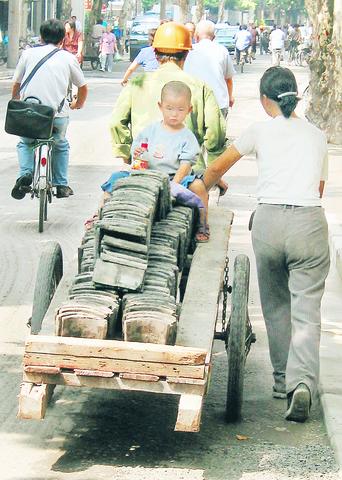Liu Xiaoqing was one of China's best-known success stories -- a movie star who parlayed her fame into a multimillion-dollar business empire.
But when she was led away from her Beijing villa in handcuffs one morning, she won a new notoriety -- as the first Chinese celebrity arrested for income tax evasion.
Experts and officials say Liu's heavily publicized June 20 arrest was the opening salvo in a crackdown on rampant tax evasion by China's new rich.

PHOTO: AP
The crackdown has been building for some time. Last August, the national tax bureau in Beijing sent local tax offices a list of high-income jobs to keep an eye on. It started with entertainers and sports stars and included entrepreneurs, lawyers, accountants and all foreigners.
Since Liu's arrest, state media have chimed in with warnings about merciless audits of high-earners.
Last month, the official Xinhua News Agency called tax evasion a "social cancer." Tax officials quoted by state media say only four of the 50 richest people in China paid income taxes last year.
Driving the crackdown is the ruling Communist Party's fear of rising public anger at the growing gap between a wealthy few and the majority of China's 1.3 billion people, many of whom feel left behind by a surging economy.
In a statement on its Web site, the State Administration of Taxation of China linked tax evasion to corruption, one of the biggest causes of popular resentment with communist rule.
"The masses are growing increasingly discontent with the unequal distribution of wealth and the phenomenon of corruption," the statement says.
"Strengthening regulation of high-income earners ... is not only an economic problem, but a social problem and a political problem."
The administration refused interview requests.
Experts say rampant tax evasion reflects the party's failure to keep pace with China's increasingly market-driven society.
They say the government is struggling to build a modern tax system in a nation where just a few decades ago wages had been under the drab conformity of a planned economy.
"China's weak tax collection system has lagged behind the country's economic growth," said Luo Ning, a tax expert at People's University in Beijing.
Even so, income tax revenues have soared during two decades of market-oriented reforms. They rose from US$19,000 in 1980 to US$12 billion last year, according to the tax administration.
Experts such as Luo say China's tax burden is light by world standards. Someone making the equivalent of US$50,000 a year would pay 20 percent, or US$9,600.
Only the wealthiest 5 percent of Chinese need pay any income tax at all, Luo said.
Taxes are only charged on salaries above US$1,200 per year -- three times the national average income and far more than most farmers and laborers make.
Still, experts and officials say tax evasion is widespread among the biggest pool of taxpayers -- the growing economic elite of China's prosperous eastern cities.
But more public anger has been directed at cases involving the super-wealthy such as Liu Xiaoqing, the arrested movie star.

Chinese Nationalist Party (KMT) Chairman Eric Chu (朱立倫), spokeswoman Yang Chih-yu (楊智伃) and Legislator Hsieh Lung-chieh (謝龍介) would be summoned by police for questioning for leading an illegal assembly on Thursday evening last week, Minister of the Interior Liu Shyh-fang (劉世芳) said today. The three KMT officials led an assembly outside the Taipei City Prosecutors’ Office, a restricted area where public assembly is not allowed, protesting the questioning of several KMT staff and searches of KMT headquarters and offices in a recall petition forgery case. Chu, Yang and Hsieh are all suspected of contravening the Assembly and Parade Act (集會遊行法) by holding

PRAISE: Japanese visitor Takashi Kubota said the Taiwanese temple architecture images showcased in the AI Art Gallery were the most impressive displays he saw Taiwan does not have an official pavilion at the World Expo in Osaka, Japan, because of its diplomatic predicament, but the government-backed Tech World pavilion is drawing interest with its unique recreations of works by Taiwanese artists. The pavilion features an artificial intelligence (AI)-based art gallery showcasing works of famous Taiwanese artists from the Japanese colonial period using innovative technologies. Among its main simulated displays are Eastern gouache paintings by Chen Chin (陳進), Lin Yu-shan (林玉山) and Kuo Hsueh-hu (郭雪湖), who were the three young Taiwanese painters selected for the East Asian Painting exhibition in 1927. Gouache is a water-based

Taiwan would welcome the return of Honduras as a diplomatic ally if its next president decides to make such a move, Minister of Foreign Affairs Lin Chia-lung (林佳龍) said yesterday. “Of course, we would welcome Honduras if they want to restore diplomatic ties with Taiwan after their elections,” Lin said at a meeting of the legislature’s Foreign Affairs and National Defense Committee, when asked to comment on statements made by two of the three Honduran presidential candidates during the presidential campaign in the Central American country. Taiwan is paying close attention to the region as a whole in the wake of a

OFF-TARGET: More than 30,000 participants were expected to take part in the Games next month, but only 6,550 foreign and 19,400 Taiwanese athletes have registered Taipei city councilors yesterday blasted the organizers of next month’s World Masters Games over sudden timetable and venue changes, which they said have caused thousands of participants to back out of the international sporting event, among other organizational issues. They also cited visa delays and political interference by China as reasons many foreign athletes are requesting refunds for the event, to be held from May 17 to 30. Jointly organized by the Taipei and New Taipei City governments, the games have been rocked by numerous controversies since preparations began in 2020. Taipei City Councilor Lin Yen-feng (林延鳳) said yesterday that new measures by